 41 citations,
September 2007 in “Pediatric emergency care”
41 citations,
September 2007 in “Pediatric emergency care” Oral medication is necessary to treat scalp fungus in children, with griseofulvin being the usual choice.
 35 citations,
November 1996 in “Journal of the American Academy of Dermatology”
35 citations,
November 1996 in “Journal of the American Academy of Dermatology” Itraconazole was effective in treating unusual M. canis infections in only one of two HIV-infected men.
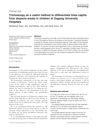 26 citations,
September 2016 in “International Journal of Dermatology”
26 citations,
September 2016 in “International Journal of Dermatology” Trichoscopy is good for telling apart tinea capitis and alopecia areata in kids.
 23 citations,
April 1991 in “Journal of The American Academy of Dermatology”
23 citations,
April 1991 in “Journal of The American Academy of Dermatology” Minoxidil solution can cause skin irritation and allergies in some users.
 22 citations,
January 2009 in “Medical mycology”
22 citations,
January 2009 in “Medical mycology” A family got a fungal infection from a boy who had contact with rabbits, but they all recovered with treatment.
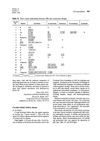 18 citations,
March 1985 in “Journal of The American Academy of Dermatology”
18 citations,
March 1985 in “Journal of The American Academy of Dermatology” Cocaine use can cause a blistering skin disease.
 17 citations,
March 1985 in “Journal of The American Academy of Dermatology”
17 citations,
March 1985 in “Journal of The American Academy of Dermatology” Minoxidil can lower blood pressure in some people.
 14 citations,
January 2008 in “Medical mycology”
14 citations,
January 2008 in “Medical mycology” Canadian porcupines in a Japanese zoo passed a skin fungus to each other.
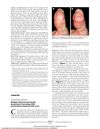 11 citations,
December 2010 in “Archives of Dermatology”
11 citations,
December 2010 in “Archives of Dermatology” A man with rare skin changes on his fingers was diagnosed with multiple myeloma-linked amyloidosis.
 6 citations,
November 2007 in “Archives of Disease in Childhood: Education & Practice”
6 citations,
November 2007 in “Archives of Disease in Childhood: Education & Practice” The document concludes that accurate diagnosis of alopecia in children relies on thorough examination and history, and while treatments exist, none can alter the course of alopecia areata, which can significantly affect a child's psychological well-being.
 6 citations,
October 1993 in “The journal of the Royal Society of Health”
6 citations,
October 1993 in “The journal of the Royal Society of Health” Children's hair loss has many causes and requires careful diagnosis and personalized treatment, including emotional support.
 6 citations,
August 1991 in “Pediatric Clinics of North America”
6 citations,
August 1991 in “Pediatric Clinics of North America” The document concludes that various hair and scalp disorders in children have specific treatments and proper diagnosis is essential.
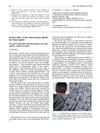 5 citations,
November 2012 in “Actas Dermo-Sifiliográficas”
5 citations,
November 2012 in “Actas Dermo-Sifiliográficas” Comma hairs are a new sign for identifying scalp fungal infections.
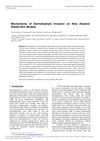 1 citations,
January 2020 in “E3S web of conferences”
1 citations,
January 2020 in “E3S web of conferences” The study found that injecting spores directly into rabbit skin effectively caused fungal skin infections, with symptoms worsening over time.
 1 citations,
September 2016 in “Springer eBooks”
1 citations,
September 2016 in “Springer eBooks” Sebum production varies by individual and is influenced by age, gender, and hormones, affecting skin and hair health.
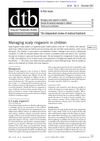 1 citations,
December 2007 in “Drug and therapeutics bulletin”
1 citations,
December 2007 in “Drug and therapeutics bulletin” New treatments for children's scalp ringworm are recommended based on recent data.
 1 citations,
November 2001 in “British Journal of Dermatology”
1 citations,
November 2001 in “British Journal of Dermatology” Oral cyclosporin doesn't stop hair loss.
 1 citations,
August 1946 in “Archives of dermatology”
1 citations,
August 1946 in “Archives of dermatology” The meeting highlighted the complexity and variability of skin conditions and differing opinions on their diagnoses and treatments.
 September 2023 in “Small animal advances”
September 2023 in “Small animal advances” The kitten's skin infection was cured with medication in three weeks.
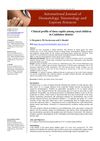 July 2023 in “International journal of dermatology, venereology and leprosy sciences”
July 2023 in “International journal of dermatology, venereology and leprosy sciences” Most rural children with scalp ringworm had a non-inflammatory type and early treatment is important to prevent complications.
 March 2023 in “Journal of the turkish academy of dermatology”
March 2023 in “Journal of the turkish academy of dermatology” High levels of ceruloplasmin might indicate more severe toenail fungus.
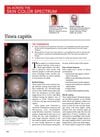 October 2022 in “The Journal of Family Practice”
October 2022 in “The Journal of Family Practice” Tinea capitis is a scalp fungal infection in children that can cause hair loss, scaling, and other symptoms.
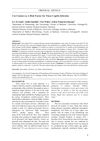 March 2022 in “Berkala Ilmu Kesehatan Kulit dan Kelamin/Berkala ilmu kesehatan kulit dan kelamin (Periodical of dermatology and venerology)”
March 2022 in “Berkala Ilmu Kesehatan Kulit dan Kelamin/Berkala ilmu kesehatan kulit dan kelamin (Periodical of dermatology and venerology)” Touching cats can increase the risk of getting a fungal scalp infection, especially in boys and kids over 5.
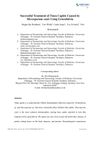 January 2022 in “International Journal of Research Publications”
January 2022 in “International Journal of Research Publications” Griseofulvin effectively treats tinea capitis caused by Microsporum canis.
 January 2021 in “Advances in health sciences research/Advances in Health Sciences Research”
January 2021 in “Advances in health sciences research/Advances in Health Sciences Research” Two siblings with gray patch tinea capitis were successfully treated after identifying risk factors.
 December 2020 in “The Journal of Family Practice”
December 2020 in “The Journal of Family Practice” The boy's itchy scalp and hair loss were likely due to head lice treatment.
 August 2019 in “International journal of current microbiology and applied sciences”
August 2019 in “International journal of current microbiology and applied sciences” Young dogs in Odisha with dermatitis are most often infected by Microsporum fungus, and Miconazole is the most effective treatment.
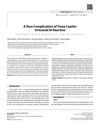 June 2017 in “Çocuk Enfeksiyon Dergisi/Journal of Pediatric Infection”
June 2017 in “Çocuk Enfeksiyon Dergisi/Journal of Pediatric Infection” Tinea capitis can rarely cause urticarial skin reactions in children.
 July 2016 in “Australasian Journal of Dermatology”
July 2016 in “Australasian Journal of Dermatology” The journal covered various dermatology topics, including treatments, disease management, and research findings.
 March 2014 in “Journal of clinical microbiology”
March 2014 in “Journal of clinical microbiology” Kerion, a scalp fungal infection, requires lab confirmation and is treated with antifungal medication and medicated shampoo.






























